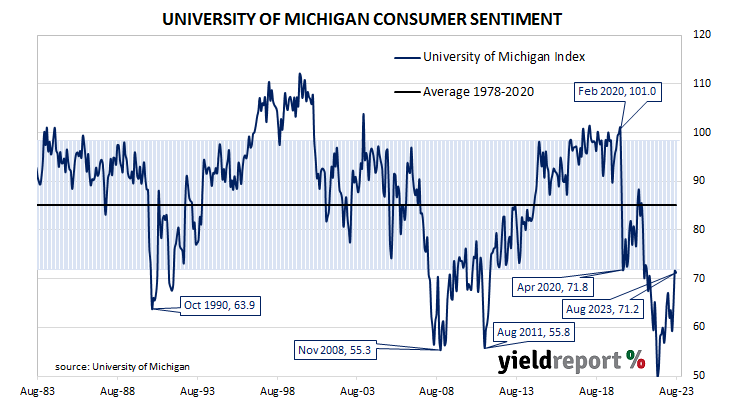Summary: University of Michigan consumer confidence index deteriorates slightly, in line with expectations; views of present conditions improve, future conditions deteriorate; substantial improvements relative to 3 months ago; Treasury yields rise, especially at short end; 2024 rate-cut expectations soften.
US consumer confidence started 2020 at an elevated level but, after a few months, surveys began to reflect a growing unease with the global spread of COVID-19 and its reach into the US. Household confidence plunged in April 2020 and then recovered in a haphazard fashion, generally fluctuating at below-average levels according to the University of Michigan. The University’s measure of confidence had recovered back to the long-term average by April 2021 but then it plunged again in the September quarter and then remained at historically low levels through 2022 and first half of 2023.
The latest survey conducted by the University indicates confidence among US households has deteriorated slightly on average after improving in the previous two months. The preliminary reading of the Index of Consumer Sentiment registered 71.2 in August, essentially in line with expectations but down a touch from July’s final figure of 71.6. Consumers’ views of current conditions improved while their views of future conditions deteriorated relative to those held at the time of the July survey.
“In general, consumers perceived few material differences in the economic environment from last month but they saw substantial improvements relative to just three months ago,” said the University’s Surveys of Consumers Director Joanne Hsu.
US Treasury bond yields rose on the day, especially at the short end. By the close of business, the 2-year Treasury yield had gained 6bps to 4.89%, the 10-year yield had added 4bps to 4.15% while the 30-year yield finished 1bp higher at 4.26%.
In terms of US Fed policy, expectations of a lower federal funds rate in the first half of 2024 softened. At the close of business, contracts implied the effective federal funds rate would average 5.34% in September, slightly above the current spot rate, and then increase to an average of 5.355% in October. December futures contracts implied a 5.41% average effective federal funds rate while August 2024 contracts implied 4.695%, 64bps less than the current rate.
It was once thought less-confident households are generally inclined to spend less and save more; some decline in household spending could be expected to follow. However, recent research suggests the correlation between household confidence and retail spending is quite weak.


